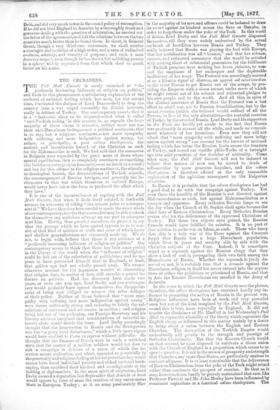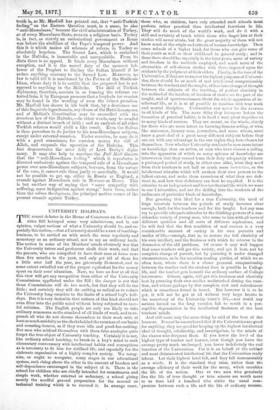THE CRUSADERS.
THEPall Mall Gazette is sorely exercised at "the perilously increasing influence of religion on politics," and finds in this phenomenon a satisfactory explanation of the outburst of national feeling which has now, for the second time, frustrated the designs of Lord Beaconsfield- to drag the country into a war waged ostensibly for British interests, really in defence of Turkey. Our contemporary asserts that it is a "fact—too clear to be disputed—that what is called
anti-Turkish feeling' in this country is, as regards the large majority of those whom it actuates, neither more nor less than anti-Mussulman feeling,—not a political sentiment, that is to say, but a religious sentiment,—not mere sympathy with suffering and mere indignation against wrong, but rather, or principally, a pure odium theologicum, the ancient and ineradicable hatred of the Christian as such for the Mehommedan as such. We had said that the massacres in Bulgaria were regarded by the great mass of those whose mental equilibrium they so completely overthrew as something else besides an outrage upon humanity,—as an insult to a creed ; and but for this offence to the religious sentiment, the stimulus to theological hatred, the denunciations of Turkish misrule, the encouragement of Russian intrigue, and generally the in- citements to that war which threatens to embroil Europe, would never have taken the form or produced the effect which they have."
It is one of the inconveniences of arguing with the Pall Mall Gazette, that when it finds itself refuted, it forthwith accuses its adversary of taking "the utmost pains to misrepre- sent it." We have therefore been careful to quote the exact words of our contemporary, in order that our readers may be able to check for themselves any malicious attempt on our part to misrepre- sent him. Having thus guarded ourselves, we proceed to say that the passage which we have quoted appears to us to con- sist of that kind of mixture of truth and error of which hasty and shallow generalisations are commonly made up. We do not, to begin with, believe that there is any evidence of a "perilously increasing influence of religion on politics." Our contemporary seems to think that there has been some period in the history of the world when the "influence of religion" could be left out of the calculation of politicians ; and he ap- pears to have persuaded himself that in England, at least, that golden age had not wholly passed away. We cannot otherwise account for his ingenuous wonder at discovering that religion does, in matter of fact, still exercise a potent in- fluence on polities. Had the discovery been made two years, or even one year ago, Lord Derby and our contempo- rary would probably have spared themselves the disappoint- ment of being now obliged to witness the utter collapse of their policy. Neither of them believed that "mere sym- pathy with suffering and mere indignation against wrong" were forces sufficiently strong and enduring to falsify the cal- culations of statesmen and set armies in motion ; and religion being left out of the reckoning, our Foreign Secretary and his literary advisers imagined that considerations of material in- terests alone would decide the issue. Lord Derby accordingly thought that the insurrection in Bosnia and the Herzegovina was but" a petty local disturbance," which a little more vigour would have enabled to Porte to repress without difficulty. He thought that the finances of Russia were in such a wretched state that the master of a million soldiers would not dare to risk a campaign in defence of a cause of which the de- sertion meant abdication, and which appealed so powerfully to the generosity and religious feeling of his subjects that they would sooner have faced individual poverty and risked national bank- ruptcy, than sacrificed their kindred and co-religionists at the bidding of diplomatists. In the same spirit of scepticism, Lord Derby assured a deputation last September that Austria at least would oppose by force of arms the creation of any autonomous State in European Turkey ; as if an army passionately Slav ,
in the majority of its men and officers could be induced to draw its sword against its kindred across the Save or Danube, in order to keep them under the yoke of the Turk. In this world of fiction, Lord Derby and the Pall Mall Gazette disported themselves, till they were rudely undeceived by the actual outbreak of hostilities between Russia and Turkey. They really believed that Russia was playing the fool with Europe, that her mobilisation was all "bounce," and that her solemn, earnest, and reiterated assurances that she would be satisfied with nothing short of substantia] guarantees for the fulfilment of Turkish promises were nothing but bruta fulmina, to con- ceal the emptiness of her exchequer and the deplorable inefficiency of her army. The Protocol was accordingly sneered at as a Russian signal of distress, an appeal ad misericordian to the other Powers to get Russia out of the scrape, by pro- viding the Emperor with a sham excuse, under cover of which he might retreat out of his solemn and reiterated pledges to his own people and to the world. And all this, in spite of the distinct assurance of Russia that the Protocol was a last effort to avoid war, not by Russian demobilisation, but by the moral coercion (which she believed would suffice) of all the Powers, in lieu of the only alternative,—the material coercion of Turkey by the sword of Russia. Lord Derby and his supporters in the Press are hardly yet awake to the fact that Russia was profoundly in earnest all the while, and made no conceal- ment whatever of her intentions. Even now they will not admit that "mere sympathy with suffering and mere indig- nation against wrong" can account for the torrent of national feeling which has borne the Russian hosts across the frontiers of Tuikey, and cowed our warlike philo-Turks of a fortnight ago into mild preachers of the doctrine of neutrality. Come what may, the Pall Mall Gazette will not be induced to believe that masses of men can be moved to deeds of self-sacrifice by mere generous impulses, and the odium theoloyicum is therefore offered as the only reasonable explanation of the agitation consequent on the Bulgarian atrocities.
In Russia it is probable that the odium theologicum has had a good deal to do with the campaign against Turkey. Yet even there the hostility of the Russian is not directed against Mahommedanism as such, but against Mahommedanisna as a usurper and oppressor. Every orthodox Russian longs to see the day when the Church of St. Sophia shall again become the chief fane of Eastern Christendom. Every Orthodox Russian yearns also for the deliverance of the oppressed Christians of Turkey. But these two objects once gained, the Russian Crusade would have fulfilled its mission. It is no part of that mission to make war on Islam, as such. Those who fancy that this is a holy war of the Cross against the Crescent forget that Russia has a large Mussulman population, which lives in peace and security side by side with the Christian subjects of the Czar. Indeed, it is sometimes urged as a reproach against the Russian clergy that they show a lack of zeal in propagating their own faith among the Mussulnians of Russia. Whether the reproach is justly de- served or not, it is certainly true that a crusade against the Mussulman religion in itself has never entered into the aspira- tions of either the politicians or priesthood of Russia, and that in Asia the Russian Mussulmans are enrolled in the Army of Armenia.
In the sense in which the Pall Mall Gazette uses the phrase, therefore, the odium theologicum has exercised hardly any in- fluence in promoting the action of Russia in the present war. Religious influences have been at work, and very powerful ones, but not of the kind imagined by the Pall Mall Gazette, —and this is true, more especially in England. It did not require the disclaimer of Mr. MacColl in last Wednesday's Pall Nall to expose the absurdity of the theory which represents the English clergy as influenced in this matter mainly by a desire to bring about a union between the English and Eastern Churches. The destruction of the Turkish Empire would undoubtedly add greatly to the strength and prestige of Orthodox Christianity. But that the Eastern Church would on that account be more disposed to cultivate a closer union with the Church of England is a proposition which seems to us open to question. It is not in the season of prosperity andstrength that Churches, any more than States, are particularly anxious to contract alliances. It is at least conceivable that the deliverance of Eastern Christendom from the yoke of the Turk might retard rather than accelerate the prospect of reunion. Be that as it may, however, it can hardly be gravely maintained that men like Professor Fawcett and Mr. John Morley have been influenced by reunionist aspirations or a fanatical odium theologieum. The truth is, as Mr. Ma.cColl has pointed out, that "anti-Turkish feeling" on the Eastern Question must, in a sense, be also "anti-Mussulman," because the civil administration of Turkey, as of every Mussulman State, rests on a religious basis. Turkey is, in fact, as strictly. an ecclesiastical government as Rome was before the abolition of the Pope's temporal power. And this it is which makes all schemes of reform in Turkey so absolutely hopeless. The Sacred Law, which is enshrined in the Multeka, is immutable and unrepealable. From its dicta there is no appeal. It binds every Mussulman without exception, and it is the sacred duty of the meanest fol- lower of the Prophet to disobey the Sultan himself if he orders anything contrary to the Sacred Law. Moreover, no law is valid till it is sanctioned by the Fetwa of the Sheik-ul- Islam, whose duty it is to certify that the proposed law is not opposed to anything in the -Multeka. The skill of Turkish diplomacy, therefore, consists in so framing the reforms ex- torted from it by European pressure that a loophole for evasion may be found in the wording of even the fairest promises. Mr. MacColl has shown in his book that, by a dexterous use of this linguistic legerdemain, any clause of the Hatti-humayoun and of Midhat's Constitution may be reconciled with the atrocious law of the Multeka,—in other words, may be evaded without a distinct breach of faith ; and an analysis of all other Turkish reforms would yield a like result. Even the Sultan is thus powerless to do justice to his non-Mussulman subjects, except under external coercion. Under coercion, he may do it -with a good conscience, for coercion means the will of Allah, and suspends the operation of the Multeka. This fact demonstrates the utter folly of Lord Derby's diplo- macy. It may also help to convince the Pall Mall Gazette that the "anti-Mussulman feeling" which it reprobates is directed exclusively against the temporal rule of a Mussulman power over non-Mussulman subjects, because, from the nature of the case, it cannot rule them justly or mercifully. It would not be possible to get up, either in Russia or England, a crusade against Mussulman rule in Morocco or Mecca. This is but another way of saying that "mere sympathy with suffering, mere indignation against wrong," have been, rather than the odium theologicum, the principal motive causes of the present crusade against Turkey.



































 Previous page
Previous page